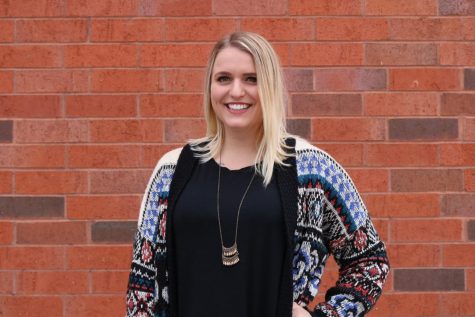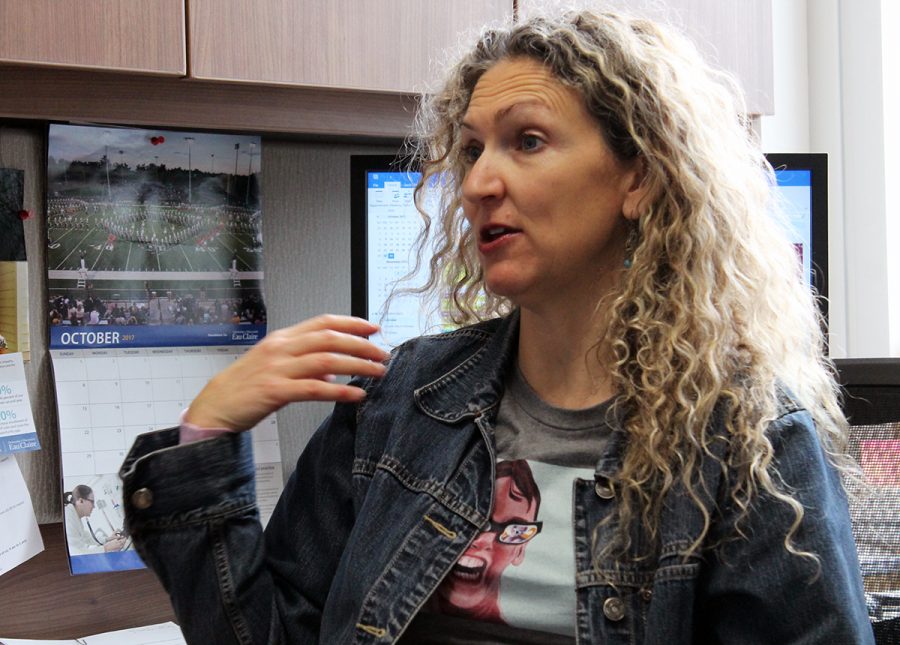Taking initiative and creating change in the community
Circles of Change aims to openly discuss and take action to minimize race issues in the Chippewa Valley
Photo by Sam Farley
Patti See said one aim of Circles of Change is to bring awareness to the biases that everyone holds.
Circles of Change, a local initiative group that aims to make the Chippewa Valley and UW-Eau Claire campus more welcoming to all races, is currently in the fifth week of its first official round of sessions.
“Circles of Change is a way to bridge the university and the community together, communicating on difficult topics such as race and implementing action plans,” said Dr. Audrey Robinson, co-coordinator of Circles of Change and director of UW-Eau Claire’s Academic Skills Center.
The initiative as a whole consists of six sessions that last about two hours and span over the course of six weeks. During the sessions, participants engage in an open discussion about race and inequities found in our society using a curriculum guide book, Robinson said.
Since its pilot round last spring, Robinson said the initiative has grown drastically.
Circles of Change recently received a grant from a Boston-based, nonprofit organization called Campus Compact. The grant of $5,000 was awarded to 40 out of the 300 submitted proposals, Robinson said.
In the spring, there were two discussion groups. This fall, Robinson said the number of circles has increased to 10. There are approximately 10-14 people in each dialogue group, and two facilitators per group.
Facilitators, Robinson said, act as neutral participants. They primarily help in guiding the conversation and make sure that everyone is moving forward in the workbooks.
“Really, it’s just us listening to the voices of people in the room,” Robinson said. “We create a safe environment where individuals can say what they need to say.”
Participants are encouraged to look at their own experiences with race and the experiences of others. Eventually, the discussion becomes focused on what can be done to minimize inequities on a community level, Robinson said. She said this kind of conversation is incredibly relevant to our state.
Robinson said the organization looks closely at various statistics — on both a community and a national scale — that are broken down by race and ethnicity. The statistics pertain to things like population, income, incarceration rate, housing, employment and education, Robinson said.
“Wisconsin is one of the worst states in regards to inequities,” Robinson said.
Patti See, current co-facilitator for a Circles of Change discussion group, senior women’s studies lecturer and distinguished student services coordinator in UW-Eau Claire’s Academic Skills Center, said her experience with the initiative has been “powerful” and “eye-opening.”
Her participation in the pilot allowed her to see the opportunities she has as a white, middle class woman in comparison to others.
“These are conversations that a lot of people, particularly white people, don’t want to have and don’t necessarily have to have,” See said. “They may not live their everyday lives thinking about the issue of race, so I think Circles of Change gives individuals a venue to do that.”
By the end of the six week period, all 10 groups will have come up with an action plan that could actually be implemented in the community. On November 16 of this year, the groups will come together for an action forum. One to three action plans will be selected and pursued by the group as a whole.
From last year’s pilot round emerged a plan to create family conversation kits. These are book kits for various age groups that feature Hmong, Asian or Latinx characters. Representation of other populations is rare in children and teen literature, Robinson said.
“It’s important for children to be exposed to different cultures, races and ethnicities. This allows for children to grow up accepting and understanding, embracing different,” Robinson said.
The kits include packets for parents to read through that explain different aspects of the cultures represented. The plan is for the conversation kits to be available in local libraries, Robinson said.
Current Circles of Change participants are comprised of Chippewa Valley community members, government officials, UW-Eau Claire members, and Chippewa Valley Technical College (CVTC) members, Robinson said.
Anyone over the age of 18 can participate, Robinson said, and the aim is to have a broad spectrum of participants. Representation of all age groups and races is vital to success, Robinson said.
“You have to make sure people are comfortable on all sides, and that everyone’s voices are being heard,” Robinson said.
Robinson said that she urges students in particular to partake in the Circles of Change discussions. Students, and anyone else who has interest in joining the conversation, can sign up for the upcoming spring session online or contact Robinson for more information.
“It’s time for everyone to come to a table and have conversations that can bring about real change,” Robinson said.
See said she has an image of an ideal community in mind. See said she hopes that one day, there will no longer be a need to have these conversations. Instead, the community will just be welcoming to everyone from the get-go.

Taylor Reisdorf is a graduate student in the English program who revels in both telling and engaging with compelling stories. This is her seventh semester with The Spectator. She prides herself in her adaptability and desire to continuously experience, learn, and appreciate new things.

